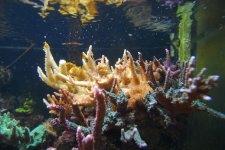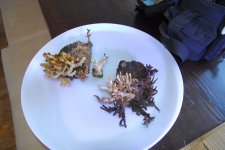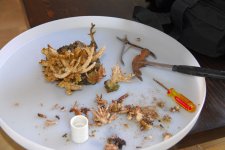So I'm sure many of you have asked the question, what would win in a fight a 3 year old acropora colony or a tunze 6080.
If you had to place a bet what would you do? If you bet on the tunze then you made the smart bet.
I found out the hard way, and I did not get to place any bets either.
While i was away a tunze 6080 turned in it's mount. It is normally pointed at the back wall. Somehow it spun and faced a large acropora insignis colony for a few days, from about 5" away.
It was a domino effect, the insignis was killed, the tissue fell off and it took out all the surrounding colonies. two blue cali torts, a small limeade, and a couple other large old colonies of acropora.
This is the outcome of the tunze mayhem
(I took this after cutting back many dead branches)

the rescue
that's what I came home to. After assessing the damage and calling the tunze a few choice words I grabbed a bucket and a small diameter hose.
This is for the benefit of new SPS keepers. Do you see the slimey dead tissue in the photo? That is what went from colony to colony and killed the corals that were no where near the flow of the tunze. As SPS dies if there is coral next to it, it will be effected by it's neighbor. The dead tissue creates havok and will cause almost all SPS within it's proximity to also begin to RTN.
The first thing I did was to use the hose to suck the dead tissue off the skeletons. You do not want any of the tissue to float off the coral and get blown aroud the tank! After i had removed as much dead tissue as possible I carefully took the rocks out of the water.

I began cutting the branches off with the frag cutters and placed all the untouched coral into the frag tank. The coral that had begun to RTN I chiseled and cut away as much of the dead parts as I could. I then used IC Gel super glue and applied it to the parts of the coral that had tissue missing. This will have the effect of cauterizing the wounded part, and hopefully stopping the RTN. It's important to glue into the healthy part of the tissue. Make sure you covering the entire dead patch of tissue
the aftermath
After chopping and gluing this is most of what was lost.
Note that the top branches of the large coral are missing from the photo.
They were the first thing I removed and threw in the garbage.

As of tonight all the coral that was left is alright. The tissue recession stopped, so the glue did the trick.
So would anyone like some acropora skeletons at the frag swap? :arg:
If you had to place a bet what would you do? If you bet on the tunze then you made the smart bet.
I found out the hard way, and I did not get to place any bets either.
While i was away a tunze 6080 turned in it's mount. It is normally pointed at the back wall. Somehow it spun and faced a large acropora insignis colony for a few days, from about 5" away.
It was a domino effect, the insignis was killed, the tissue fell off and it took out all the surrounding colonies. two blue cali torts, a small limeade, and a couple other large old colonies of acropora.
This is the outcome of the tunze mayhem
(I took this after cutting back many dead branches)

the rescue
that's what I came home to. After assessing the damage and calling the tunze a few choice words I grabbed a bucket and a small diameter hose.
This is for the benefit of new SPS keepers. Do you see the slimey dead tissue in the photo? That is what went from colony to colony and killed the corals that were no where near the flow of the tunze. As SPS dies if there is coral next to it, it will be effected by it's neighbor. The dead tissue creates havok and will cause almost all SPS within it's proximity to also begin to RTN.
The first thing I did was to use the hose to suck the dead tissue off the skeletons. You do not want any of the tissue to float off the coral and get blown aroud the tank! After i had removed as much dead tissue as possible I carefully took the rocks out of the water.

I began cutting the branches off with the frag cutters and placed all the untouched coral into the frag tank. The coral that had begun to RTN I chiseled and cut away as much of the dead parts as I could. I then used IC Gel super glue and applied it to the parts of the coral that had tissue missing. This will have the effect of cauterizing the wounded part, and hopefully stopping the RTN. It's important to glue into the healthy part of the tissue. Make sure you covering the entire dead patch of tissue
the aftermath
After chopping and gluing this is most of what was lost.
Note that the top branches of the large coral are missing from the photo.
They were the first thing I removed and threw in the garbage.

As of tonight all the coral that was left is alright. The tissue recession stopped, so the glue did the trick.
So would anyone like some acropora skeletons at the frag swap? :arg:
Last edited:



